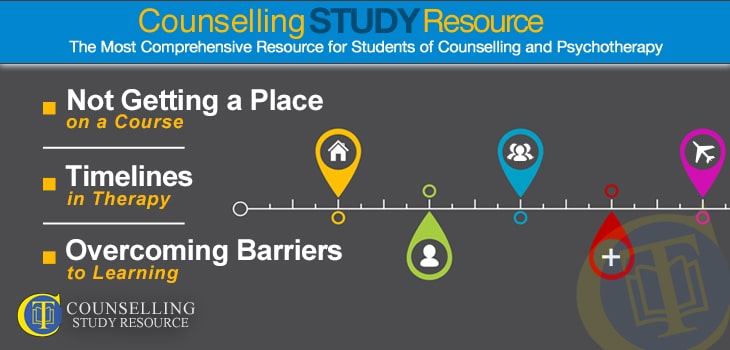081 – Not Getting a Place on a Course – Timelines in Therapy – Overcoming Barriers to Learning
In episode 81 of the Counselling Tutor Podcast, Ken Kelly and Rory Lees-Oakes offer guidance for disappointed students who haven’t got a place on the course they wanted. ‘Practice Matters’ goes on to describe the use of timelines in therapy. Finally, the presenters discuss possible challenges to learning.
Not Getting a Place on a Course (starts at 1.46 mins)
It really is so very disappointing to find out you didn’t get a place on the counselling course you applied for. Ken and Rory offer some tips for those in this situation:
- Remember that many courses are massively oversubscribed – so quite a number of people are bound not to get a place.
- Reflect on any feedback you have been given and try to learn from this.
- Think about whether there are other course providers that you could apply to.
- Don’t forget that you don’t have to follow the same awarding body all the way through – it’s usually fine to swap between them on your progression route.
- Consider what you could do to improve your chances next year – and apply again then.
- Bear in mind that tutors are only human, and it’s possible to have a personality clash with one.
- Tutors are under huge pressure these days to retain students for the full course duration, so they have to be selective about who they take, choosing those who seem best placed to be able to complete the training.
Above all, remember that if you really want to be a counsellor, and are willing to persevere and work hard, you will get there: so don’t give up!
Timelines in Therapy (starts at 11.13 mins)
It is easy, during counselling, to lose the ability to see the wood for the trees. Rory explains how using timelines can really help the counsellor and client together to ‘helicopter’ above the situation, spotting patterns and roots of problems. Timelines can be especially useful in supporting clients to take an overview of loss and other significant experiences in their life.
Rory has written a detailed handout on this section of the podcast, which you can download here. Alternatively, it is available in the Handouts Vault and Counselling Study Resource (CSR).
Overcoming Barriers to Learning (starts at 15.50 mins)
Counselling training really is very demanding compared to many other courses of the same academic level: it demands a lot personally too. It can be difficult to balance the demands of studying, working and relationship/family commitments. Ken and Rory offer a number of tips on this:
- Before you start training, plan ahead for how you will slot all the different elements into place.
- If you have a specific learning difficult, e.g. dyslexia, then make sure you enlist your tutor’s support, and get hold of any software (e.g. spellcheckers) that can help you; many such tools are available free of charge online these days.
- Come as you are with who you are: counsellors are hugely diverse and there is a place for everyone. For example, many people with a hearing or visual impairment have made a successful career in counselling.
- Don’t procrastinate – try to stay on top of things as you go along.
- If you do experience problems, don’t be afraid to ask for help. Tell your tutor straight away (unless you feel your tutor is the root of the problem – in which case, speak to the head of department).
- If you had difficult experiences in education in the past, remember that neither it nor you are the same now – so try not to stay stuck there.
- Remember that any barrier can be overcome if you are really determined: it can help to picture yourself holding that final diploma.
- Be as kind and empathic to yourself as you would to clients, showing yourself a high level of self-compassion.
Links and Resources
Free Handout Download
Using Timelines in Therapy
